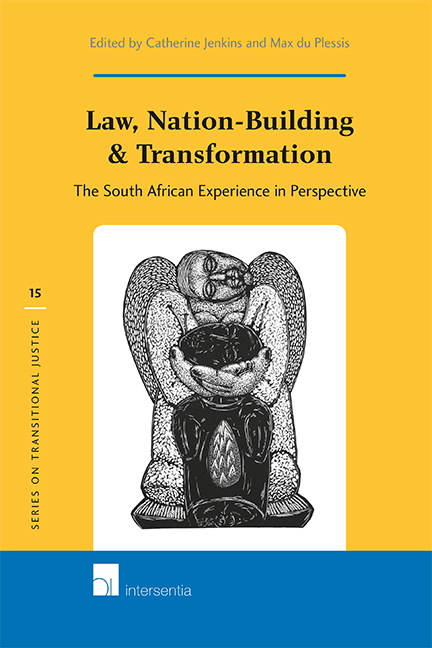Book contents
- Frontmatter
- Editors’ Foreword
- Contents
- Chapter 1 Transitional Justice: Lessons from South Africa?
- Chapter 2 Reflections on Post-Apartheid Nation-Building: Identity, Participation, Community
- Chapter 3 The Truth and Reconciliation Commission Process: A Retrospective
- Chapter 4 Rights at Work: The Transition to Constitutional Democracy and Women in South Africa
- Chapter 5 Crime, Policing and Nation-Building
- Chapter 6 Public Schools for Afrikaners in South Africa
- Chapter 7 Behind the Mask of the Rainbow Nation: The Limits of Law in Post-Apartheid South Africa
- Chapter 8 The Transformation of the Judiciary
- Chapter 9 Assessing the Social Transformation Performance of the South African Constitutional Court: From Totalitarianism to the Rule of Law
- Chapter 10 The Transformation of Land Law
- Chapter 11 The South African Presidency in Comparative African Context
- Chapter 12 Aspects of the Treatment of Freedom of Expression in South Africa’s Democratic Transition
- Chapter 13 Constitutionalism in Commonwealth Africa: Comparative Perspectives
Chapter 12 - Aspects of the Treatment of Freedom of Expression in South Africa’s Democratic Transition
Published online by Cambridge University Press: 16 December 2020
- Frontmatter
- Editors’ Foreword
- Contents
- Chapter 1 Transitional Justice: Lessons from South Africa?
- Chapter 2 Reflections on Post-Apartheid Nation-Building: Identity, Participation, Community
- Chapter 3 The Truth and Reconciliation Commission Process: A Retrospective
- Chapter 4 Rights at Work: The Transition to Constitutional Democracy and Women in South Africa
- Chapter 5 Crime, Policing and Nation-Building
- Chapter 6 Public Schools for Afrikaners in South Africa
- Chapter 7 Behind the Mask of the Rainbow Nation: The Limits of Law in Post-Apartheid South Africa
- Chapter 8 The Transformation of the Judiciary
- Chapter 9 Assessing the Social Transformation Performance of the South African Constitutional Court: From Totalitarianism to the Rule of Law
- Chapter 10 The Transformation of Land Law
- Chapter 11 The South African Presidency in Comparative African Context
- Chapter 12 Aspects of the Treatment of Freedom of Expression in South Africa’s Democratic Transition
- Chapter 13 Constitutionalism in Commonwealth Africa: Comparative Perspectives
Summary
INTRODUCTION
South Africa has fairly recently emerged from centuries of racial repression, in which the fundamental equality and dignity of the majority of South Africans were negated. This repression culminated in the system of apartheid that prevailed from the late 1940's to the early 1990’s. As is often pointed out, one of the particularly shocking aspects of apartheid was the manner in which the law was used as an instrument of division and oppression. Far from acting as a bulwark against injustice, the law accentuated social and economic divisions by, amongst other things, restricting the right to vote on racial lines, providing for separate areas in which people were permitted to live and separate public amenities that they could use and prohibiting sexual relations across racial lines.
Laws dramatically restricting freedom of expression were an important pillar of apartheid's legal edifice. As in other totalitarian states, the use of a myriad of laws to clamp down on free speech, and particularly media freedom, was a vital component in the apartheid state's attempts to cover up human rights violations and to stifle political and civil opposition. Newspapers were banned, political gatherings were prohibited, the content of publications was censored and journalists and editors were regularly harassed by the security police. The culture of repression that prevailed is captured by Richard L Abel:
‘Government either banned all outdoor meetings or refused to issue the requisite permits. It outlawed numerous organisations. It excluded and deported foreign correspondents and television crews. It regulated the entry of all foreign books, newspapers, magazines and films. It controlled television and dominated radio. It severely limited what the domestic media could publish, seized offending books, and punished publication and even ownership with fines and prison terms. It curtailed access to scenes of unrest or opposition. It prosecuted and jailed opponents for long terms …’
These restrictive laws generally took the form of legislation emanating from Parliament, such as the Internal Security Act, the Publications Act and the Official Secrets Act, which was subsequently replaced by the Protection of Information Act.
- Type
- Chapter
- Information
- Law, Nation-Building and TransformationThe South African Experience in Perspective, pp. 281 - 312Publisher: IntersentiaPrint publication year: 2014



